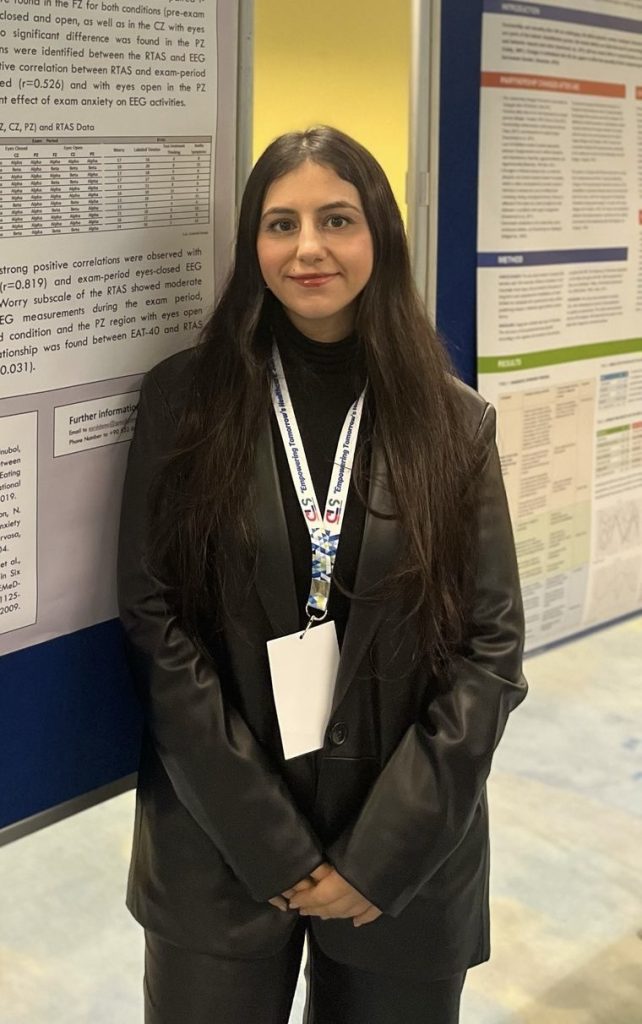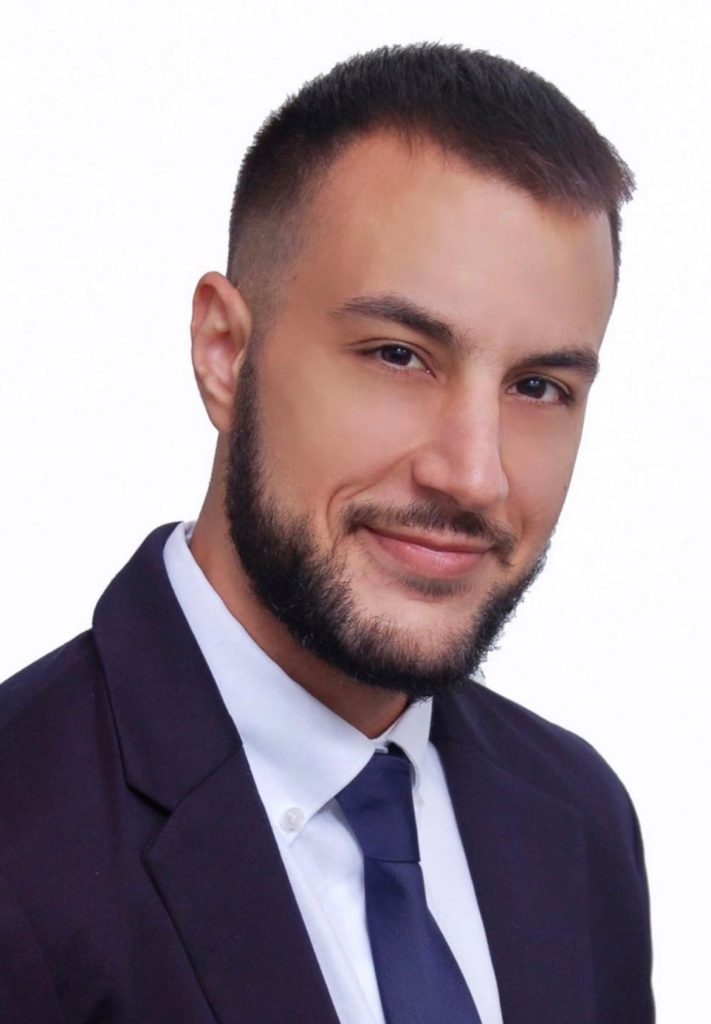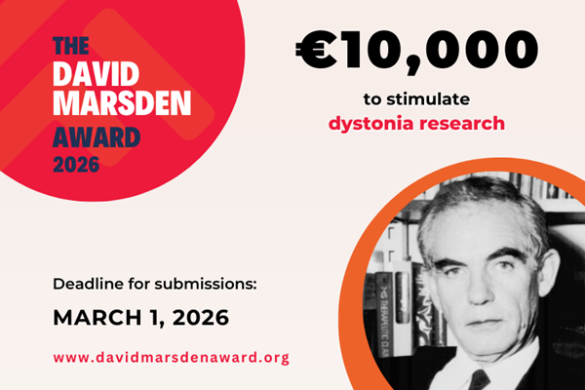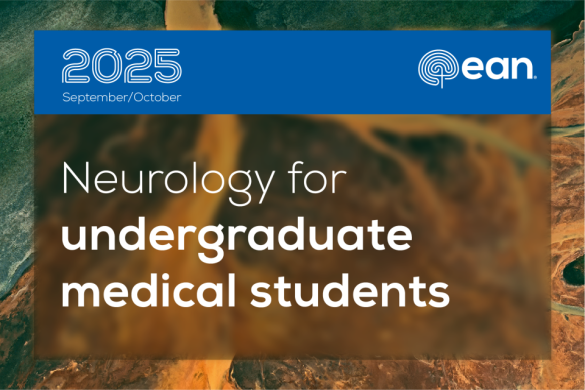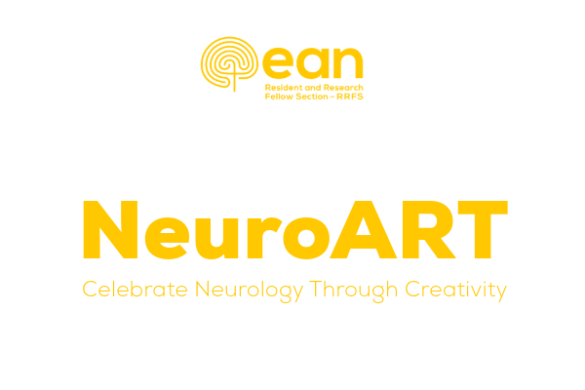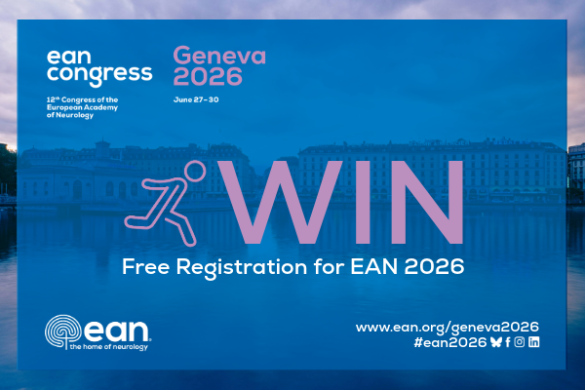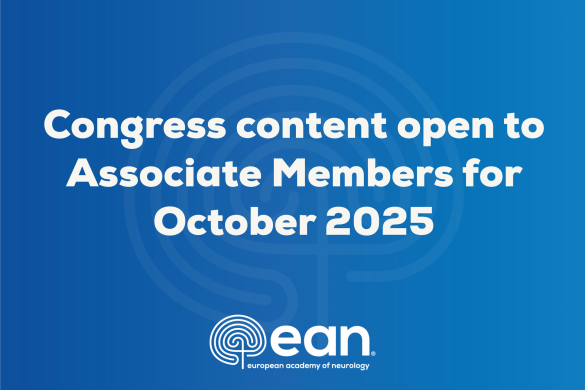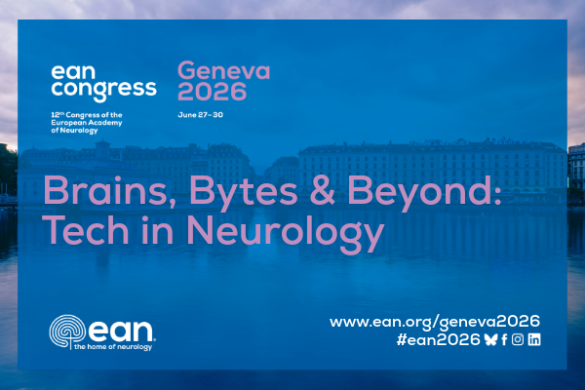The EAN Student Task Force is delighted to present the winners of this year’s ‘Why Neurology?’ essay competition.
The competition aims to explore the motivations behind choosing neurology as a career path and to strengthen connections with EAN Student members, while also raising the profile of neurology among medical undergraduates. The EAN is committed to inspiring the next generation of neurologists—those who will go on to lead and mentor within the field—and to boosting the involvement of medical students in EAN initiatives.
To celebrate the perspectives of these aspiring neurologists and provide them with a unique platform, the winners of the ‘Why Neurology?’ essay competition have been invited to present their work at the EAN Congress, onsite in Helsinki, on Sunday, 22 June, from 14:05 to 14:35 EEST in the Scientific Theatre (see this session in the EAN 2025 programme overview).
We are thrilled to showcase the five winning essays below. Congratulations to the authors for their inspiring contributions!
Esra Sultan Demir, Türkiye, 5th year Student
The Gateway to the Unknown: Why Neurology?
As human history has explored the mysteries of our bodies, so has interest in the complexity of the brain’s structure and functionality. Beginning with Hippocrates’s assertion that the brain is the centre of thought and emotion, neurology entered a new era with the ‘Neurons that fire together, wire together’ revolution of neuroscience. Developments in the 19th and 20th centuries led to a better understanding of the interaction between nerve cells. Today, the rise of artificial intelligence and neurotechnology is enabling not only a better understanding of neurological diseases, but also the exploration of the limits of the human mind, unravelling the fundamental mechanisms of consciousness and thought, and taking human abilities to a new dimension through brain-machine interaction.
The fact that neurology has become one of the most dynamic and progressive fields of medicine by expanding its boundaries day by day was one of the biggest factors that led me to this field. The complex relationship between the brain and the body is still not fully understood. The mechanisms that drive our thoughts and emotions remain a great mystery. Current studies show that brain function is mediated by electrical and chemical connections. So, what exactly are the factors that make us make our decisions and influence our state of mind? If neural activity shapes our consciousness and behaviour, then what really drives our decisions? These questions are part of what drew me to the journey of discovery that neurology offers. As research progresses, I believe we will be able to solve some of these puzzles – but each answer will bring new questions. I am excited by the journey into the unknown, making new discoveries and staying curious. I believe that my curious and inquisitive personality will guide me as I venture deeper into the brain, helping me to better understand human nature and strengthening my desire to advance in the endless field of discovery that neurology offers.
One of the most exciting aspects of modern neurology is neurotechnology. Brain-computer interfaces, neuroprostheses, and AI-enabled diagnostic systems are taking neurology to a whole new level. During my studies on EEG as a student, I observed that it was possible to better understand the effects of psychiatric diseases such as anxiety on the brain by analysing brain activity. These observations show that we can bring innovative, effective and targeted methods to the treatment processes of diseases with personalised neuromodulation techniques in the field of neuropsychiatry. Literature research has shown that artificial intelligence can assess a person’s level of consciousness by analysing EEG waves, determine the extent of brain damage, and predict epilepsy crises before they occur. In the future, we can control devices with the power of thought and apply patient-specific treatments in AI-supported neurology clinics. The combination of artificial intelligence and neurology will revolutionise the treatment of many diseases by enabling us to better understand the functioning of the brain. As a future neurologist, I cannot remain indifferent to this transformation. By contributing to the development of neurotechnology from a doctor’s perspective, I will work to advance the diagnosis and treatment of neurological diseases. However, my goals are not limited to technological development. Although the world is progressing rapidly, access to healthcare is still a serious problem in many regions. On my journey to become a ‘world doctor’, I want to work especially in countries where neurological health is inadequate and to reduce the inequality of opportunity in the treatment of neurological diseases. I think I can raise awareness about neurodegenerative diseases and neuropsychiatric disorders through volunteer neurology projects. Leading scientific developments and making a real difference by touching lives is the biggest motivation for me.
The brain is the greatest mystery of humanity. This extraordinary organ that guides our thoughts, emotions and decisions still has countless undiscovered secrets. I chose neurology to explore the unknown. My goal is not only to treat diseases, but also to understand the connection between the brain and the body by going deep into the human mind, to improve the quality of life of patients with neurotechnology, and to revolutionise diagnosis and treatment. For me, neurology is more than a field of science; it is a profound journey of curiosity, discovery, and making a difference in human lives. Beyond being a medical specialty, it is a gateway to the greatest unknown of humanity. And I am ready to open that door wide open.
Fatemehsadat Shahrezaei, Italy, 4th year student
I remember the exact moment I fell in love with the brain. Not in a textbook or a lecture hall, but sitting next to my grandfather as he struggled to remember my name. It was like watching someone try to tune a radio—the signal was there, somewhere, but the clarity kept slipping away.
The brain fascinates me. Not just as an organ, but as the storyteller of our lives. Three pounds of tissue somehow holds everything we are: our first kiss, our favourite song, the smell of Mom’s cooking. But what happens when that storyteller starts losing pages?
During my time at an Alzheimer’s clinic in Iran, I saw it happen over and over. People who had lived rich, full lives suddenly couldn’t remember what they had for breakfast. Brilliant professors who forgot how to button their shirts. But it was my grandfather’s journey that really hit home. Day by day, I watched him change—not dramatically, but in small ways. The way he’d pause mid-sentence, searching for words that used to come easily. How his eyes would sometimes light up with recognition, only to dim again moments later.
There’s this beautiful poem by Sohrab Sepehri that always makes me think of the brain:
Life has wings as vast as death,
A leap as deep as love,
Life is not something that can be forgotten on the shelf of habit.
Every time I read it, I think about how perfectly it captures what happens in neurological disorders. It’s like watching someone’s life slowly being placed on that shelf of habit, gathering dust.
But here’s the thing about being a neurologist—we’re not just scientists. We’re detectives, artists, and sometimes even poets. We have to be. Because understanding the brain isn’t just about analysing scans and prescribing medications. It’s about seeing the person behind the diagnosis.
I’ve always been a bit of an art nerd (yes, that kid who spent way too much time in museums). Now, I’m fascinated by how art therapy can help rewire neural pathways. It’s amazing to watch someone with dementia pick up a paintbrush and suddenly access memories they thought were lost. The brain finds new ways to sing its song.
I am particularly fascinated by the role of art therapy in improving neurological symptoms, especially in patients with dementia, stroke, and neurodegenerative disorders. Artistic expression—whether through painting, music, or movement—engages the brain in ways that may stabilise emotions, trigger memories, and even reshape neural pathways.
Looking forward, my greatest dream as a future neurologist is to bridge the gap between science and creativity—to use cutting-edge neuroimaging, early diagnosis techniques, and innovative therapeutic approaches like art therapy to enhance patient care. Neurology is not just a medical discipline; it is a field that allows us to touch the very core of what makes us human.
In Persian, we call a neuron Asab (عصب)—it means ‘strong connection’. I love that. Because that’s what I want to do: help rebuild those connections. Not just the neural ones, but the human ones too. When I see patients, I’m not just treating a brain—I’m trying to preserve who they are.
Maybe it sounds idealistic, but I believe every disrupted neural melody can find its rhythm again. We might not be able to cure every condition, but we can help people hold onto their stories a little longer. And sometimes, that’s enough.
So here I am, still asking that same question that hit me while sitting next to my grandfather: what happens when the brain changes? But now I’m not just asking—I’m working on answers. Because somewhere in the complex dance of neurons and synapses, there’s a symphony waiting to be restored.
Aleksandar Sič, Serbia, 5th year student
I was a bad student.
Disclaimer, this is not a sad story, this is a victory story.
I come from a very poor background. I had already graduated from a physiotherapy college, only to realise: that is not what I wanted to do in life. To be honest, I tried a lot of different careers during the next five years – sports physio, fitness trainer, hotel receptionist, bartending. It wasn’t until I hit the midlife crisis in my twenties when I realised what I really wanted to pursue, and that it was medicine. The beginning was hard, as I mentioned my poor background – I had absolutely no support from my family for going into medicine and studying instead of working for the next six-plus years. I got into medical college on my second attempt, due to my poor high-school grades and GPA. The first three years were a struggle, and I mean A STRUGGLE.
I was barely passing oral exams; I almost failed my second year. It took me four attempts to pass the physiology course. I had a below average GPA, no emotional support, no motivation and I was most certainly not happy. Not to mention I was working multiple part-time jobs just to be able to live in the capital city. As I am not the one to give up on anything, somehow I kept going. During the summer break between my 3rd and 4th year on medical school, I had a medical emergency. It was a typical hot summer day and I suddenly felt dizzy while walking, but not ordinary dizzy. I couldn’t focus my gaze and my vision was blurry. The next thing I knew, I was waking up on the ground with the ambulance doctors and technicians around me, only to learn I had had a grand mal seizure. As I was abroad at the time, visiting a friend, I was taken to a local hospital, still disoriented and tired. Since I had no health insurance there, only the basic labs were done and I was discharged. The same night, I took an overseas flight home. That flight gave me a solid ten hours of thinking time, as I had no idea what was going on with me, if I were sick, or what my next steps were. After landing in my home country, I visited the ER and had diagnostic tests done by neurologists. I was advised to schedule an EEG, but it was summer vacation time and all the epileptologists in my city were unavailable. So, I never had the EEG testing done.
Two months later, I started my 4th year of med school. In our curriculum, the neurology course is taken during the winter semester of the fourth year. One of the first lectures was on epilepsy disorders and it was given by one of the best epileptologists in the region. After the lesson, I decided to approach her and ask for advice on my next steps. After carefully listening to me, she immediately agreed to do my EEG right away. Luckily, there were no abnormalities, and I was healthy. We kept in touch and, as my interest in neurology grew, I began attending her on-call shifts, learning from her first-hand. She eventually became my thesis mentor, but more importantly, she became a source of support and a family figure I deeply needed at that time. Based on my newly acquired motivation and support, my grades and my GPA improved significantly. I had passed all my 4th year courses with flying colours and became happier in every way. During the winter break of my fifth year, I was accepted for a one-month clinical rotation at a neurology clinic in New York. It was an incredible learning experience where I gained invaluable knowledge and hands-on practice (and yes, I completely drained my savings account in the process). Along the way, I also had the opportunity to publish a few papers in the field of neurology, which further fuelled my passion for the specialty.
Felix culpa – a series of unfortunate events, led to something beautiful. Now, as a fifth-year student, I can finally clearly envision my future and main goal – to be a neurologist. Through it all, my mentor has remained by my side, offering unconditional support and guidance. To this day, she means the world to me, both professionally and personally.
In a strange way, neurology saved me. And now it’s time for me to pay the favour back and use it to save others.
Ceysu Ay, Türkiye, 6th year student
I want to begin this essay by using our brains to stimulate our imagination with a story. Imagine a ten-year-old girl alone at home with her father and sister. Suddenly, the father drops down on the floor and starts shaking. The frightened little girl screams to her mother outside, uncontrollably sobbing. As the mother arrives, luckily, she knows what to do. She gives the father medication. The little girl rushes upstairs to the room to try to keep her six-year-old sister in, to save her from this horrifying image, wondering what is happening to her dad.
As I am the girl in the story, neurology means the reason my father is alive to me. I learned what my father had was something called a seizure, which did not make any sense to me. For that ten-year-old, the meaning of neurology changed from just an absurd word to the greatest puzzle of her life, as it still is to me.
My father explained to his ten-year-old daughter that it was just something his brain does sometimes. I knew then what a brain was, but I did not think I would need to spend my whole life figuring out what it does. I thought the answer would be simple. As I grew older, my questions progressed with me. My questions changed from ‘what?’ to ‘why?’, and ‘why?’ became ‘how?’. The more I learned, the more questions arose. This journey of unknowns and the demand to search for answers have taken me to medical school and earned me the nickname ‘Neuro-Nerd’.
I am choosing neurology to answer the questions of that little girl inside of me who is still terrified but mesmerised by the capabilities of the human brain. I am choosing neurology because even the smallest seeming neuron has the most valuable role in how we act, think, and survive. I am choosing neurology because I frequently think about that insignificantly significant neuron standing among millions. I am choosing neurology because I am that neuron. And I feel neurology is also chasing me because I ask the questions.
Since my curiosity started at a young age, finding resources that provided simple answers was challenging. I started reading more and more about the brain and neuroscience in high school. Some resources gave examples and simplified cases that were easier to understand. I learned a lot of fun facts that made me sound smart. I only wished I could share the exquisiteness of the human brain and the thrill of finding explanations in cases that seemed impossible at first look with more people around me. People would read murder mysteries; I would read rare neurology case stories.
Everybody wants a degree or a respectful title. Every medical student dreams of hundreds of publications with the highest GPAs. Everyone I know works for an astonishing CV, most of those without a genuine idea of what they want to do. If you asked me about my dream in life, it would be one young kid to tell my name as the reason for their interest in neurology and neuroscience. I want to write books for youngsters to make neuroscience approachable to them. I want to contribute to animations that explain brain functions to kids. To reach that goal, I believe that to make something so complex and intricate look so simple displays an understanding of that subject. That is my main goal in life. I am neither there nor close to that goal, but I know I will try until I get there. My main goal and the reason I have my dreams is to hopefully give a positive and joyful meaning to the word ‘neurology’ to another ten-year-old.
Yea Seo Kwon, Czech Republic/South Korea, 5th year student
Dear Judy,
I hope this finds you well. I am your brain. I’ve been sending you signals for the past five years during your medical school journey. Finally, they seem to have been delivered to you. Let me remind you of the signals that I’ve been sending that fascinate you and make you decide that neurology is something you want to pursue.
Signal 1: The Path to Understanding Me
For a long time, you didn’t quite understand me, and that’s okay. You and I didn’t exactly have the smoothest start, right? When you first met me during your first year of medical school, you were startled and confused during neuroanatomy, facing tracts and puzzling how reticular formation could be that complicated. Then I finally saw the spark in your eyes when it all clicked together, the moment you realised how the corticospinal tract explained a patient’s hemiparesis. The connection between anatomy and reality was finally made.
It wasn’t until your neurology internship in 5th year that you saw me in real life. It finally brought the clinical pictures you’ve only seen in your case study slides. I saw that look in your eye again. I saw it when you met a patient presenting with a stroke, how a stroke patient’s life changed in a single moment with symptoms like hemiparesis. You then realised that understanding me meant so much more than just academic achievement. This ability would let you give patients the ability to speak, move, and be themselves again. That was the moment you said, “This is a puzzle I want to be solving for the rest of my life”.
Signal 2: Grandma
I know this is something you don’t like to talk about so much, I know. The guilt, the questions, the helplessness you felt as a child. That feeling you’ve felt when you realised you never got to connect with her when you were ten years old. You understood that she wasn’t connecting with anyone, but you were upset that whatever she had (now we know that it’s dementia) took the chance for you to build a relationship with her. I remember when you were thinking, ‘Why is she not like us? Why is she not playing with me? Why is no doctor doing anything? Why isn’t she getting better? Will she ever remember my name?’ You wanted answers. You wanted to understand me, a sick version of me. Every time you visited your grandma you told yourself you were going to find ways to help her so you could be friends with her. Now that continues with you wanting to help people like her. And guess what? That day is approaching you.
Signal 3: Pi
I remember you trying to remember the numbers of pi. It wasn’t about just numbers; it was about you trying to see how much you can remember in an hour. The way I work, storing short-term or long-term memories or even forgetting them, intrigued you. The cognitive function we have and how memory shapes personalities is why you’ve been drawn more to diseases that are directly affected by that. Dementia, neurodegeneration, and stroke; each of these diseases take parts of memories, taking piece by piece of a person. And I know you; you want to understand it, fix it, and stop it.
Signal 4: The future
This is what I imagine your future would look like in ten years. You would be a specialised neurologist in cognitive impairment deeply involved in research to find ways to slow down or even stop neurodegenerative diseases. Perhaps you would work on gene therapy that targets the root causes of conditions you once thought were untreatable. Maybe you would continue using AI in neurology for early diagnosis and treatment. I could also see you continue your passion for teaching, shaping younger doctors the way your mentors shaped you. I imagine you participating in multiple conferences worldwide, presenting your multidisciplinary studies across the globe regarding neurodegenerative diseases that use AI.
So, even when everything seems uncertain, know this: I will always be here, sending the signals, and you will learn how to read them. No matter how complex the puzzle is, you will find a way to solve it.
Remember this is your brain talking, your own brain. I chose you for a reason.
Kind regards,
Your brain

